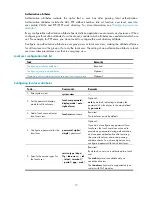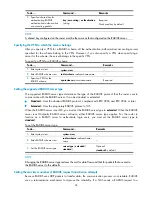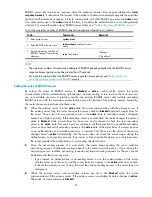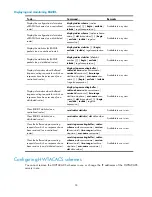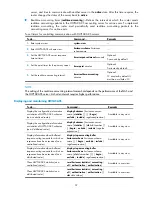
31
Configuring the IP address of the security policy server
The core of the HP EAD solution is integration and cooperation, and the security policy server is the
management and control center. Using a collection of software, the security policy server provides
functions such as user management, security policy management, security status assessment, security
cooperation control, and security event audit.
The NAS checks the validity of received control packets and accepts only control packets from known
servers. To use a security policy server that is independent of the AAA servers, you must configure the IP
address of the security policy server on the NAS. To implement all EAD functions, configure both the IP
address of the iMC security policy server and that of the iMC configuration platform on the NAS.
To configure the IP address of the security policy server for a scheme:
To do…
Command…
Remarks
1.
Enter system view.
system-view
—
2.
Enter RADIUS scheme
view.
radius scheme
radius-scheme-name
—
3.
Specify a security policy
server.
security-policy-server
ip-address
Required.
No security policy server is
specified by default.
NOTE:
Specify up to eight security policy servers for a RADIUS scheme.
Enabling the RADIUS offload feature
Some RADIUS servers do not support EAP authentication. They cannot process EAP packets. In this case,
the router must process EAP packets from EAP clients before forwarding them to the server. The RADIUS
offload feature enables a router to process EAP packets for this purpose.
The RADIUS offload feature needs the cooperation of the local EAP authentication server. They work
together as follows:
1.
After receiving EAP packets from an EAP client, the local EAP authentication server interacts with
the client, encapsulates the authentication information of the client into the RADIUS MS-CHAPv2
attribute, and sends the attribute in a RADIUS authentication request to the RADIUS server for
authentication.
2.
When a RADIUS server receives the requests, it resolves the authentication information in the
request, performs authentication, and then encapsulates and sends the authentication result in a
RADIUS packet to the local EAP authentication server.
To deploy the RADIUS offload feature, configure the local EAP authentication server, specifying the EAP
authentication method as PEAP-MSCHAPv2.
Configuring interpretation of RADIUS class attribute as CAR parameters
According to RFC 2865, a RADIUS server assigns the RADIUS class attribute (attribute 25) to a RADIUS
client. However, the RFC only requires the RADIUS client to send the attribute to the accounting server on
an "as is" basis; it does not require the RADIUS client to interpret the attribute. Some RADIUS servers use
the class attribute to deliver the assigned CAR parameters. In this case, the routers must interpret the
attribute to implement user-based traffic monitoring and controlling. To support such applications,
configure the routers to interpret the class attribute as the CAR parameters.

